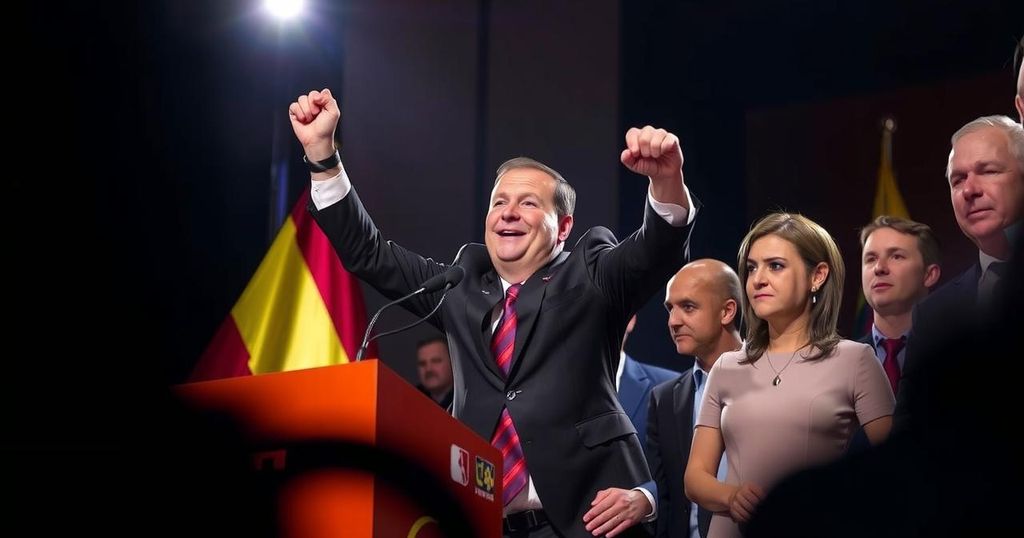World news
AFRICA, CAL, CALIN GEORGESCU, ELECTIONS, ELENA LASCONI, EUROPE, EUROPEAN UNION, GEORGESCU, GOVERNMENT, LASCONI, MARCEL CIOLACU, NAMIBIA, NATIONAL ASSEMBLY, PARLIAMENTARY SEATS, ROMANIA, SAVE ROMANIA UNION, SDP, SNAP ELECTIONS, SOCIAL DEMOCRATIC, SOCIAL DEMOCRATIC PARTY, STAR, UK, UKRAINE
Oliver Grayson
0 Comments
Romania Elections: Social Democrats to Retain Majority Amid Far-Right Gains
Romania’s governing Social Democratic Party is set to maintain its parliamentary majority with approximately 24% of votes, despite a significant uptick in support for the far-right Alliance for Uniting Romanians, which has garnered 18%. Voter turnout reached a historic high as the country grapples with the influence of ultra-nationalist politics amid ongoing challenges related to its economic and geopolitical situation.
In the recent Romanian general elections, the governing left-leaning Social Democratic Party (SDP) is projected to retain its parliamentary majority, achieving approximately 24 percent of the vote. However, it faces a growing challenge from the far-right Alliance for Uniting Romanians, which reported significant gains at around 18 percent. The National Liberal Party and the reformist Save Romania Union garnered 14 percent and 10 percent, respectively, emphasizing a competitive political environment. Early voter turnout was notable, with over 52.3 percent of eligible voters participating, marking the highest engagement for a parliamentary election in two decades.
While the final results are pending the counting of ballots from Romanians living abroad—who are anticipated to favor conservative parties—the election unfolds amid increasing support for ultra-nationalist factions. The SDP’s position notably aligns with pro-European Union policies and a supportive stance towards Ukraine. Amid this political landscape, Calin Georgescu, an independent with far-right ties, has emerged controversially as a strong presidential contender, emphasizing the complexities present within Romanian politics today.
Georgescu’s rise, characterized by a robust TikTok following and messaging that critiques Romania’s role in the Ukraine conflict, raises concerns over the influence of far-right ideologies in contemporary governance. As he prepares for a second-round presidential match against reformist candidate Elena Lasconi, the outcome of these elections is projected to shape Romania’s domestic and foreign policies significantly.
This electoral cycle underscores Romania’s pivotal moment, as citizens face a choice between maintaining democratic values and confronting a potential drift toward nationalism, which bears implications for the nation’s relationship with the European community and its response to regional security challenges, particularly regarding Russia’s incursions into Ukraine.
The backdrop of this electoral event reveals a complex landscape marked by the resurgence of far-right ideologies in Romania, particularly as the country grapples with international pressures, including those stemming from its neighbor Ukraine. Current tensions with Russia and previous affiliations with Soviet influence complicate public sentiment and political alignments. Under such circumstances, the Social Democratic Party has managed to maintain a substantial following by aligning closely with European integration principles. The evolving dynamics of public support for far-right parties, such as the Alliance for Uniting Romanians, reflect a growing discontent with traditional parties and their handling of national issues, including economic concerns encapsulated in Romania’s high fiscal deficit.
In conclusion, Romania’s recent elections have shed light on a shifting political landscape where the governing Social Democratic Party is poised to maintain its majority, though confronted by formidable challenges from an invigorated far-right opposition. Voter participation has reached unprecedented levels, indicating heightened political engagement. As the country navigates this critical juncture, the query remains as to how these electoral results will influence Romania’s stance within the broader European framework and its commitment to democratic principles amid increasing populist sentiments. The results suggest a necessity for vigilance in preserving Romania’s democratic processes against the rising tide of nationalism that threatens to redefine the political narrative.
Original Source: www.aljazeera.com




Post Comment